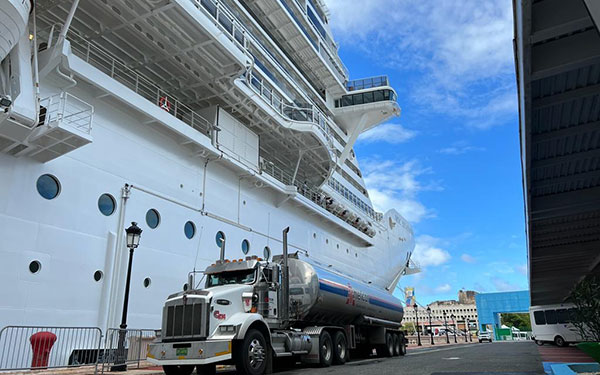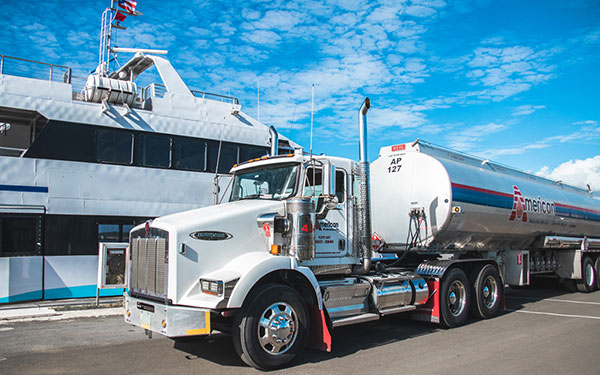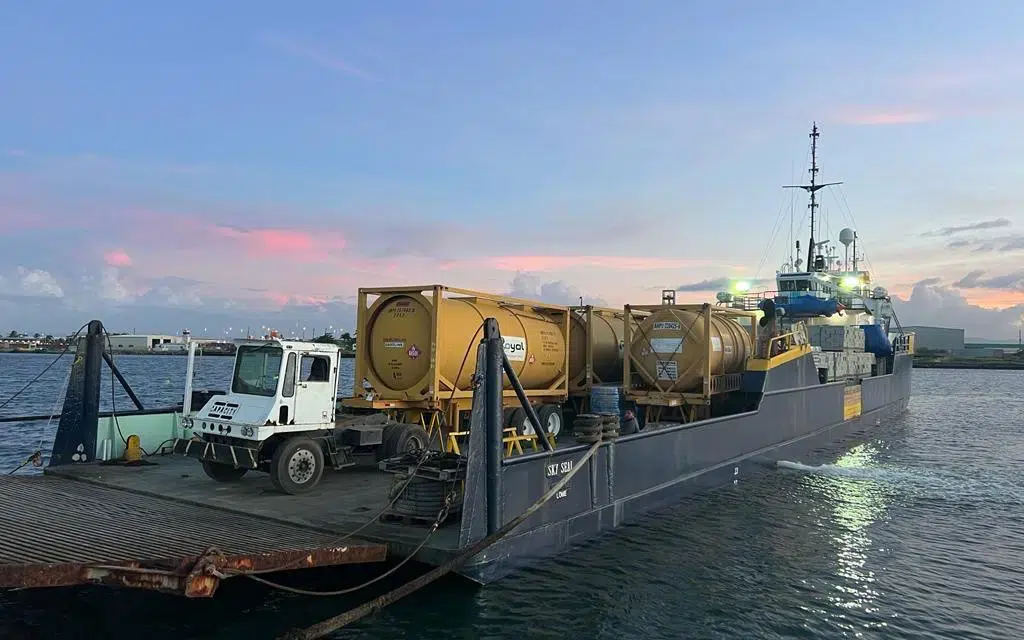Efficient on-port fuel delivery is essential for minimizing vessel downtime. Crew schedules, port slots, and fleet rotations all depend on smooth coordination.
By ensuring reliable on-port fueling, operators reduce delays, lower operating costs, and maintain schedule integrity.
Step-by-step breakdown of the on-port fuel delivery process
- Scheduling the delivery. Vessel operators coordinate fuel type, delivery volume, estimated arrival time, and berth position with the supplier.
- Barge or truck arrival. Delivery may be executed via bunker barge alongside the vessel or fuel truck dockside, depending on port access and vessel size.
- Fuel transfer and documentation. Once connections are secured and checked, fueling begins. All stages are documented, and a Bunker Delivery Note (BDN) is issued as required by MARPOL Annex VI, including confirmation of sulphur limits and fuel quality.
- Safety protocols and post-delivery sampling. Safety precautions such as spill prevention, grounding, and supervision during transfer are enforced. The supplier must provide a MARPOL representative fuel sample, drawn continuously from the ship’s bunker manifold, which is sealed and retained according to IMO guidelines.
What makes a reliable on-port fuel delivery supplier?

Regulatory compliance:
A dependable supplier operates in full adherence to international and local regulations, such as MARPOL Annex VI and fuel quality standards. This ensures every delivery meets legal requirements and environmental commitments.
Accurate communication and punctuality:
Clear coordination with vessel operators, agents, and port authorities prevents delays and misunderstandings. Timely delivery keeps vessels on schedule and avoids costly port time extensions.
Consistent fuel quality:
Reliable on-port fuel delivery provide fuel that meets or exceeds ISO specifications and is free from contamination. Regular quality checks and proper handling protect engines and maintain vessel performance.
Logistics and storage expertise:
Strong supply chain capabilities and well‑managed storage facilities ensure fuel availability when and where it’s needed. Efficient logistics also allow for flexible scheduling and rapid response in urgent situations.
Why trust Royal Petroleum for on-port fuel delivery?

Royal Petroleum is a trusted supplier serving Puerto Rico’s principal ports with efficient, compliant, and cost‑effective bunkering services. We deliver premium fuels and lubricants tailored to the needs of the maritime, industrial, transportation, and fuel retail sectors.
Our advantages include:
- Comprehensive fuel options, including marine gas oil (ultra‑low sulfur diesel), gasoline, and tax‑exempt fuel for export.
- Truck‑to‑vessel delivery capability, offering flexibility for vessels of all sizes and operational needs.
- Regulatory compliance and safety in every transfer, meeting all applicable local and international standards.
- Strong relationships with ports, marinas, and industrial facilities across Puerto Rico to ensure timely, reliable delivery.
Ensure on‑time fuel delivery for your vessel!
Partner with Royal Petroleum for compliant, timely, and efficient on-port fuel delivery operations. Contact us today to discuss your needs, request a quote, or explore partnership opportunities at (787) 794‑1985 or info@royalpetroleumpr.net.
Sources:
International Maritime Organization. (2022). Guidelines for the sampling of fuel oil for determination of compliance with MARPOL Annex VI. MSC-MEPC.2/Circ.18.
International Maritime Organization. (n.d.). Bunker delivery note requirements under MARPOL Annex VI and SOLAS. MEPC.1/Circ.875.Add.1.
International Maritime Organization. (n.d.). Regulations on fuel oil quality and delivery under MARPOL Annex VI. Regulation 18 and associated appendices.
CIMAC Working Group Marine Lubricants. (2008). Guidelines for the lubrication of medium‑speed diesel engines (2nd rev. ed.). International Council on Combustion Engines.
U.S. Coast Guard. (n.d.). Title 33 CFR Part 156 – Oil and hazardous material transfer operations. Electronic Code of Federal Regulations: U.S. Department of Homeland Security.

